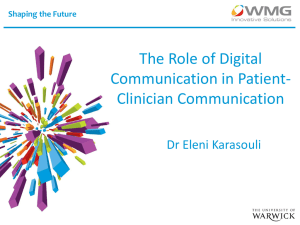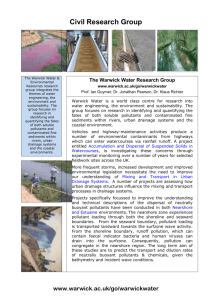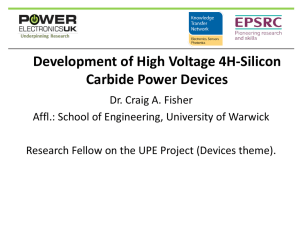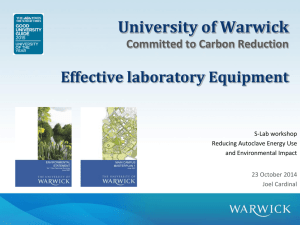Current Vacancies - University of Warwick
advertisement
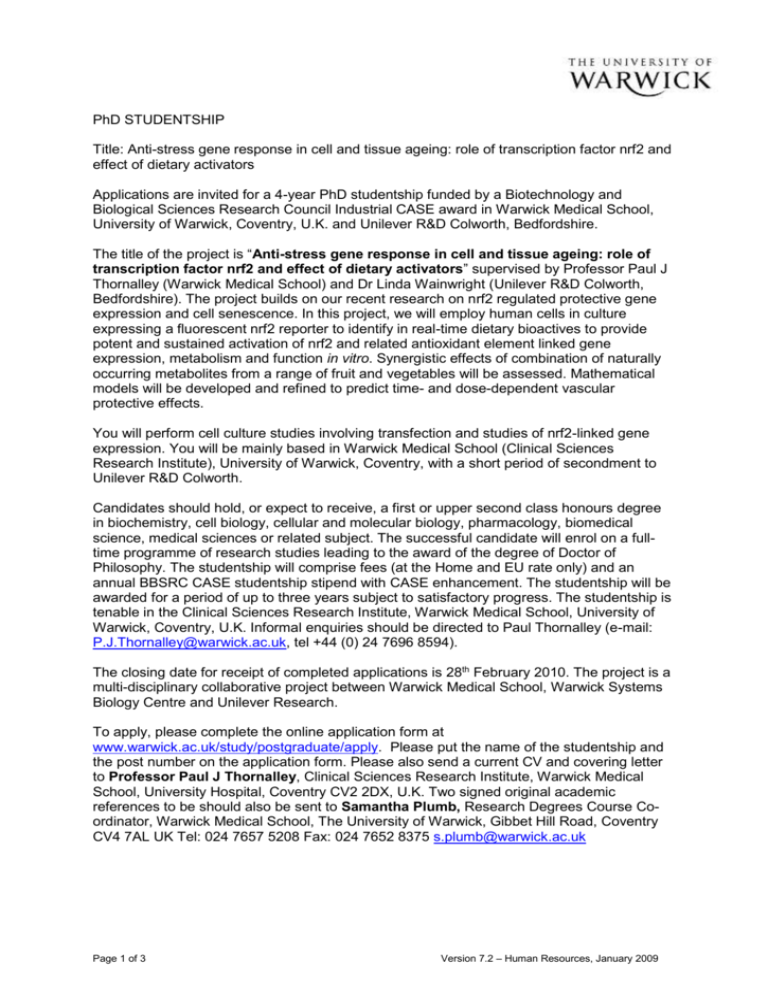
PhD STUDENTSHIP Title: Anti-stress gene response in cell and tissue ageing: role of transcription factor nrf2 and effect of dietary activators Applications are invited for a 4-year PhD studentship funded by a Biotechnology and Biological Sciences Research Council Industrial CASE award in Warwick Medical School, University of Warwick, Coventry, U.K. and Unilever R&D Colworth, Bedfordshire. The title of the project is “Anti-stress gene response in cell and tissue ageing: role of transcription factor nrf2 and effect of dietary activators” supervised by Professor Paul J Thornalley (Warwick Medical School) and Dr Linda Wainwright (Unilever R&D Colworth, Bedfordshire). The project builds on our recent research on nrf2 regulated protective gene expression and cell senescence. In this project, we will employ human cells in culture expressing a fluorescent nrf2 reporter to identify in real-time dietary bioactives to provide potent and sustained activation of nrf2 and related antioxidant element linked gene expression, metabolism and function in vitro. Synergistic effects of combination of naturally occurring metabolites from a range of fruit and vegetables will be assessed. Mathematical models will be developed and refined to predict time- and dose-dependent vascular protective effects. You will perform cell culture studies involving transfection and studies of nrf2-linked gene expression. You will be mainly based in Warwick Medical School (Clinical Sciences Research Institute), University of Warwick, Coventry, with a short period of secondment to Unilever R&D Colworth. Candidates should hold, or expect to receive, a first or upper second class honours degree in biochemistry, cell biology, cellular and molecular biology, pharmacology, biomedical science, medical sciences or related subject. The successful candidate will enrol on a fulltime programme of research studies leading to the award of the degree of Doctor of Philosophy. The studentship will comprise fees (at the Home and EU rate only) and an annual BBSRC CASE studentship stipend with CASE enhancement. The studentship will be awarded for a period of up to three years subject to satisfactory progress. The studentship is tenable in the Clinical Sciences Research Institute, Warwick Medical School, University of Warwick, Coventry, U.K. Informal enquiries should be directed to Paul Thornalley (e-mail: P.J.Thornalley@warwick.ac.uk, tel +44 (0) 24 7696 8594). The closing date for receipt of completed applications is 28th February 2010. The project is a multi-disciplinary collaborative project between Warwick Medical School, Warwick Systems Biology Centre and Unilever Research. To apply, please complete the online application form at www.warwick.ac.uk/study/postgraduate/apply. Please put the name of the studentship and the post number on the application form. Please also send a current CV and covering letter to Professor Paul J Thornalley, Clinical Sciences Research Institute, Warwick Medical School, University Hospital, Coventry CV2 2DX, U.K. Two signed original academic references to be should also be sent to Samantha Plumb, Research Degrees Course Coordinator, Warwick Medical School, The University of Warwick, Gibbet Hill Road, Coventry CV4 7AL UK Tel: 024 7657 5208 Fax: 024 7652 8375 s.plumb@warwick.ac.uk Page 1 of 3 Version 7.2 – Human Resources, January 2009 JOB DESCRIPTION POST TITLE: BBSRC CASE/Unilever funded PhD Studentship DEPARTMENT: Warwick Medical School SUB-DEPARTMENT: Clinical Sciences Research Institute POST RESPONSIBLE TO: Professor Paul J Thornalley POST RESPONSIBLE FOR: Pursuing research project for examination for award of the degree of Doctor of Philosophy SALARY: £16,623 pa (including the supplement from Unilever) REFERENCE NUMBER: CLOSING DATE: 28th February 2010 Aim of the project: To pursue research on the designated project “Anti-stress gene response in cell and tissue ageing: role of transcription factor nrf2 and effect of dietary activators” for 3 years with enrolment on a full-time programme of research studies leading to the award of the degree of Doctor of Philosophy. Requirements of project: 1. To pursue research on the designated project “Anti-stress gene response in cell and tissue ageing: role of transcription factor nrf2 and effect of dietary activators” for 3 years under the guidance and supervision of Professor Paul J. Thornalley and others (Clinical Sciences Research Institute, Warwick Medical School) and Dr Linda Wainwright (Unilever) 2. To attend training courses as deemed necessary by the supervisors and required for the conducting the programme of research on the designated project. 3. To comply with regulations of Warwick Medical School for leading to the award of the degree of Doctor of Philosophy . 4. To conduct research following procedures of good laboratory practice and standards operating procedures as designated by the local guidelines of the Clinical Sciences Research Institute, Warwick Medical School 5. To work alongside areas where research is conducted on clinical human samples. You must have appropriate immunisation prior to taking up the appointment. Page 2 of 3 enrolment on a full-time programme of research studies Version 7.2 – Human Resources, January 2009 PERSON SPECIFICATION POST TITLE: BBSRC CASE/Unilever funded PhD Studentship DEPARTMENT: Warwick Medical School, Clinical Sciences Research Institute The Person Specification focuses on the knowledge, skills, experience and qualifications required to undertake the role effectively. REQUIREMENTS The postholder must be able to demonstrate: ESSENTIAL (E) or DESIRABLE (D) REQUIREMENTS MEASURED BY: a) Application Form b) Test/Exercise c) Interview d) Presentation A first or upper second class honours degree or equivalent in biochemistry, cell biology, cellular and molecular biology, pharmacology, biomedical science, medical sciences or related subject (or expect to shortly receive one). Good communication and written skills Ability to: Reason accurately Think logically Solve problems Work independently Innovate Assimilate information Make decisions Act on own initiative The ability to interact with research team members in a co-operative, responsible and reliable manner The ability to work to tight schedules and to make effective use of time and facilities Computer literate Familiar with Microsoft Office Understanding of biochemistry, metabolism and molecular physiology Interest in dietary relationships to health and ageing – particularly protective gene expression likely contributing to healthy ageing E a E E a, c a, c E c E c E D D a, c a, c a, c D c In accordance with the national agenda in higher education to modernise pay and grading structures, the University of Warwick has completed a significant programme of change that has seen the introduction of a new pay spine and single job evaluation scheme. The work commenced in September 2004 and was communicated and implemented across the University in August 2006. All salaries detailed within this recruitment document are post implementation and will be subject to normal salary progression as defined by the relevant terms and conditions of service. In conjunction with this, the University is now commencing discussions with trade unions to harmonise terms and conditions. Further details on this phase of the project will be available shortly. Page 3 of 3 Version 7.2 – Human Resources, January 2009 FURTHER PARTICULARS Research team of Professor Thornalley Professor Paul J. Thornalley is Professor of Metabolic Biochemistry and Systems Biology. He leads a Protein Damage and Systems Biology research group co-supervised by Dr Naila Rabbani Assistant Professor of Experimental Systems Biology. Both have joint appointments in Warwick Medical School and Systems Biology Centre (SBC). They are both based in modern, well-equipped laboratories in the CSRI, University Hospital campus. They have been studying mechanisms underlying ageing-related disorders – particularly proteome damage and metabolic mechanisms protecting against it - for over 25 years. They co-supervise a research team of 12 investigators (6 post-doctoral researchers, 4 PhD students and 2 technicians) based mainly in the CSRI. Cell culture and clinical studies are performed in the CSRI laboratories and pre-clinical in vivo studies in facilities maintained jointly with the Department of Biological Sciences. Research interests: Professor Paul J. Thornalley (Recipient of Fritz Worwag International Science Prize 2007 for studies on vitamins in medicine): ANTIOXIDANT RESPONSE ELEMENT-LINKED GENE EXPRESSION: Isothiocyanate-mediated activation, nrf2 transcription factor signal transduction, and prevention of cancer, vascular disease and ageing. PROTEIN GLYCATION, OXIDATION AND NITRATION: Physiological formation and quantitation of glycation, oxidation and nitration adducts; proteolytic processing of damaged proteins; involvement in the chronic complications of diabetes, cardiovascular disease, atherosclerosis, renal failure, cirrhosis, Alzheimer’s disease, arthritis and ageing. PROTEOMICS: Identification of proteins and sites of damage, functional effects, modelling and bioinformatics. VASCULAR DISEASE: Biochemical dysfunction, metabolic monitoring and therapy. THIAMINE METABOLISM AND THERAPY IN DIABETES: Clinical trial of thiamine and thiamine derivatives for the prevention of vascular complications of diabetes, studies of cellular and physiological basis of disturbance in thiamine metabolism in diabetes and link to risk of vascular complications Dr Naila Rabbani (Recipient of Shaul Massry Prize on Uremic Research and Toxicity, 2005): ANTIOXIDANT RESPONSE ELEMENT-LINKED GENE EXPRESSION: Small molecular activation of transcription factor nrf2 and anti-lipogenic effect. VASCULAR DISEASE: Disturbance of lipoprotein metabolism – particularly relate to post-translational modifications of low density lipoprotein (LDL) and high density lipoprotein (HDL). PROTEIN GLYCATION, OXIDATION AND NITRATION: Physiological formation and quantitation of glycation, oxidation and nitration adducts – particularly lipoproteins and involvement in the chronic complications of diabetes THIAMINE METABOLISM AND THERAPY IN DIABETES: Clinical trial of thiamine and thiamine derivatives for the prevention of vascular complications of diabetes, studies of cellular and physiological basis of disturbance in thiamine metabolism in diabetes and link to risk of vascular complications OTHERS INVOLVED IN THE PROJECT Experimental data on similar projects on-going in the Protein Damage and Systems Biology research group are being used to develop and refine a mathematical model of dietary bioactive activated and nrf2-regulated protective gene expression. The mathematical modelling is led by Professor David Rand. Professor David Rand (Warwick Systems Biology Centre) led earlier research in nonlinear dynamics and was awarded the LMS Whitehead prize. Over the past decade he has worked on applying mathematics to biological problems: spatial systems in ecology, epidemiology and evolutionary theory, pair approximations, and mathematical descriptions of biological processes at the molecular and cellular level – including circadian rhythms, new statistical techniques for the analysis of the sort of biological systems data being considered in this grant. Since 1998 he has been an investigator on over £7m of grants from EPSRC, BBSRC, the EU and the Wellcome Trust. He is director of the Warwick SBC. He also directs the Interdisciplinary Programme in Cellular Regulation (IPCR) spanning biological, mathematical and physical sciences and is one of the three main investigators. Page 4 of 3 Version 7.2 – Human Resources, January 2009 Activation of transcription factor nrf2 will be followed in this project by time-lapsed video microscopy of green fluorescent fusion constructs of nrf2 and related proteins. This will be supervised by Dr Tony Shymgol. Dr Tony Shmygol (Warwick Medical School) Tony Shmygol’s laboratory is also based in the CSRI where he uses multidimensional digital imaging and confocal microscopy combined with mathematical modelling to investigate the signalling pathways. His experience in time-lapsed video microscopy and related instrumentation will we employed on this project. He will be designated as second supervsiro of this project. Relevant publications: 1. Xue, M.Z. and Thornalley, P.J. (2007) Sulforaphane suppresses reactive oxygen species and induces transcriptional activation of antioxidant response element related genes expression in human BJ-5ta fibroblasts. Comp. Biochem. Physiol. 146A, S55 – S56 2. Foyer, C.H., Faragher, R., Thornalley, P.J. (2009) Redox metabolism and longevity relationships in animals and plants. Preface. SEB Exp Biol Ser 62, xix-xxx, 2009 3. Xue, M. Qian, Q., Antonysunil, A., Rabbani, N., Babaei-Jadidi, R. and Thornalley, P.J. (2008) Activation of NF-E2-related factor-2 reverses biochemical dysfunction of endothelial cells induced by hyperglycemia linked to vascular disease. Diabetes 57, 2809 -2817. 4. Xue, M.Z., AntonySunil, A., Rabbani, N. and Thornalley, P.J. (2009) Chapter 15. Protein damage by glycation, oxidation and nitration in the ageing process. Advances in quantitation of protein damage and the emerging importance of decline in enzymatic defences as the ageing phenotype develops. In: Redox Metabolism and Longevity Relationships in Animals and Plants (Foyer, C., Faraghar, R. and Thornalley, P.J. eds), SEB Exp Biol Ser 62, pp. 227 – 265. 5. Thornalley, P.J, Xue, M. and Rabbani, N. (2009) Methodologies for in-vitro and in-vivo activity of bioactive compounds. In: Health-Promoting Properties of Fruits and Vegetables (Terry, L. ed.), CABI, Oxford, UK., in press. The University The University of Warwick is arguably the most successful of UK universities founded within the past half-century, and has earned an outstanding reputation both for research and teaching. Warwick is comfortably ranked within the top ten of all UK university newspaper rankings including 6 th in the most recent Sunday Times Good University Guide. Founded in 1965 Warwick has been a unique and uniquely successful British university combining a “can-do” entrepreneurial spirit with a commitment to absolute academic excellence. Professor Nigel Thrift, Warwick’s 5th Vice-Chancellor, was appointed last year to transform the University from a leading university within the UK to become one of the world’s top 50 universities by 2015. A new university strategy will be launched in autumn 2007 as a result of extensive consultation with staff, students and Warwick’s many external stakeholders. Warwick employs nearly 5,000 members of staff, of whom 1,500 are academic and research staff spread across 28 academic departments and 30 research centres; 91% of the academic staff are in departments with research ratings of 5 or 5*. Of the 24 departments assessed under the subject review process, 22 were rated excellent (or scored 21 or more out of 24) for teaching quality. The University of Warwick has a total student population of over 20,000 of whom approximately 12,000 are undergraduates and almost 7,000 are postgraduates. Nearly one-quarter of Warwick’s students are international, helping to create a vibrant and cosmopolitan campus environment which is valued and celebrated by the University. The University’s campus, located on a 400-acre site spanning the south west boundary of Coventry and the county of Warwick, has an open and pleasant outlook and was voted “Best University Campus” in a national student poll published by the Times Higher Education Supplement in 2006. The campus offers excellent sporting facilities, including a swimming pool, a newly refurbished gym, a climbing wall, an all weather running track and acres of football and rugby pitches. Page 5 of 3 Version 7.2 – Human Resources, January 2009 An indoor tennis centre is currently under construction. The renowned Warwick Arts Centre is the largest outside London with the Mead Gallery showing visiting collections of contemporary art, a concert hall, two theatres and a cinema. The University of Warwick is ideally placed for easy access to London (just over one hour on the train), close to the picturesque towns of Warwick, Kenilworth and Leamington Spa and about 45 minutes from the centre of Birmingham. The University is in the heart of Shakespeare’s Warwickshire with historic Stratford-upon-Avon, the Royal Shakespeare Company and the Cotswolds all within easy reach. The University of Warwick has a turnover approaching £350 million. The University continues to invest heavily in its campus infrastructure and environment and its future capital plan includes: a new student union building; a 500 bed student residency; new hotel accommodation for visiting academics; a refurbishment of the Library; a further extension to the Warwick Business School; and a state of the art Warwick Digital Laboratory, the foundation stone for which was laid by Prime Minister Gordon Brown in May 2007. Capital investment in the next year alone will total £35 million. Further details about the University of Warwick can be found at http://www.warwick.ac.uk. The Managerial and Administrative Structure of the University The University’s administrative and managerial structure is headed by the Vice-Chancellor, supported by the Deputy Vice-Chancellor, the Registrar, the Finance Director and the University Secretary. However, as with all such structures, the informal lines of decision making and the sharing of responsibility for planning and strategy flatten the hierarchy. Institutional level decisions are initially made by a group comprising academics and administrators who form the Senate Steering Committee which operates much along the lines of a weekly cabinet for the University. The Registrar, Mr Jon Baldwin, is responsible for the administration of the University and is supported in this task by a team of Senior Officers, each of whom is responsible for a key area and associated offices of University administration: the Academic Registrar, the Estates Director, the Director of Personnel Services, the Director of Campus Affairs, the Director of IT Services, the Director of Communication, the Director of the International Office, the Director of Research Support Services and the University Librarian. A number of office heads and directors report in turn to these Senior Officers. To ensure overall co-ordination between and across the University’s administration, all administrative posts within academic departments have a “dotted line” reporting to the University Registrar as well as the Department in which they are based. Warwick Medical School (WMS) Actin Dean WMS: Professor Martin Underwood The Medical School at Warwick was established in 2000 as part of an expansion in the number of Medical School’s nationally to deliver the additional capacity needed to support the Government’s plan to increase the number of UK trained medical graduate’s joining the NHS. The School is organised in three Institutes, the Institute of Clinical Education (ICE) which is the base for all the School’s educational programmes, the Clinical Sciences Research Institute (CSRI), home for our biomedical and acute hospital-based research groups, and Health Sciences Research Institute (HSRI) which focuses on research in the community-based clinical disciplines. The School’s principal clinical partners are University Hospitals Coventry and Warwickshire NHS Trust (UHCW), the George Eliot Hospital NHS Trust, South Warwickshire General Hospitals NHS Trust, Coventry Teaching Primary Care Trust and the other Primary Care Trusts within Warwickshire. Additional clinical placements are provided by Worcestershire Acute Hospitals NHS Trust, Worcestershire Mental Health Partnership NHS Trust and by a number of general practices throughout the West Midlands. At UHCW, a state of the art PFI hospital has been and provides an optimal environment to support both research and education at the Trust. The Clinical Sciences Page 6 of 3 Version 7.2 – Human Resources, January 2009 Building and the Clinical Sciences Research Institute are based on the UHCW site and provide a base for education and laboratory research for the Medical School. The Medical School’s research is focused around a number of multi-disciplinary and cross-specialty teams; collaboration within and outside School and University is encouraged and investigators are encouraged to work across traditional disciplinary boundaries in innovative ways. Our research is currently focussed around: Metabolic Diseases (diabetes, obesity, cardiovascular disease and hypertension), Reproductive Medicine (pre-term labour, preeclampsia and infertility), Public Mental Health (epidemiology of common mental disorders, parenting, social determinants of health), Clinical Trials (Emergency Care and Rehabilitation, Cancer, Diabetes), Primary Care (Self-Management, chronic conditions, lay perspectives, palliative care), and Health Care Systems Improvement. WMS works closely with many departments across the University for both our Research and education programmes; these include the Department of Biological Sciences, the School of Health and Social Studies, the Department of Sociology, the Department of Statistics, Warwick Business School, Warwick Manufacturing Group, the Law School and the Department of Mathematics. Clinical Sciences Research Institute (CSRI) Research within the CSRI is focused on major themes which are underpinned by multi-disciplinary, low-boundary and inter-related Research Theme Groups. Its major themes are: Cardiovascular & Diabetes Research Reproductive Health Molecular Research Clinical Effectiveness Rapid expansion of these research areas is anticipated. The School has made a significant investment in laboratories and equipment. March 2004 saw the opening of a brand new, purpose-built Clinical Sciences Building co-located with the University Hospitals Coventry and Warwickshire NHS Trust, thus creating an excellent environment for clinical research. Professors at Warwick Medical School Clinical Professors The current clinical professors at the University of Warwick are Martin Underwood [Primary Care Research & Vice-Dean of WMS], Steve Thornton [Obstetrics & Associate Dean (Research)], Ed Peile [General Practice & Associate Dean (Education) & Director of the Institute of Clinical Education], Sudhesh Kumar [Medicine, Diabetes and Metabolism & Associate Dean (External Affairs)], Sarah Stewart-Brown [Public Health & Director of the Health Sciences Research Institute], Francesco Cappuccio [Cardiovascular Medicine and Epidemiology], Matthew Cooke [Emergency Medicine & Clinical Systems Improvement], Jeremy Dale [Primary Care], Bill Fulford [Philosophy & Mental Health], Fang Gao Smith [Anaesthesia Critical Care & Pain], Damian Griffin [Orthopaedic Surgery], Simon Murch [Child Health], Donald Singer [Clinical Pharmacology], Swaran Singh [Social and Community Psychiatry] and Scott Weich [Psychiatry]. Non-Clinical Professors The non-clinical professors are Victor Zammit [Molecular Biochemistry & Director of the Clinical Sciences Research Institute], Peter Abrahams [Anatomy], Jane Barlow (Public Health in the Early Years], Janet Dunn [Cancer Clinical Trials], Martin Feelisch [Experimental Medicine & Integrative Biology], Dimitris Grammatopoulos [Molecular Medicine], Sallie Lamb [Rehabilitation & Clinical Trials], David Spanswick [Molecular Neurosciences], Peter Spurgeon [Health Services Management], Nigel Stallard [Medical Statistics], Justin St. John [Reproductive Biology], Ala Szczepura [Health Services Research], Paul Thornalley [Systems Biology], and Margaret Thorogood [Epidemiology]. Page 7 of 3 Version 7.2 – Human Resources, January 2009
